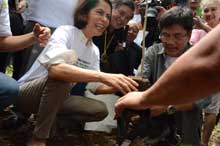DENR CREATES ACTION CENTER FOR FAST ACTION ON ENVIRONMENTAL CONCERNS
The Department of Environment and Natural Resources (DENR) has created an action center that will respond quickly to environmental issues and concerns raised by its stakeholders, particularly members of civil society organizations.
The creation of the DENR Action Center was embodied in Special Order No. 2016-494 signed by Secretary Gina Lopez, who earlier promised to strengthen civil society participation in environmental governance guided by the principle of the common good.
"Before, the civil society was in a contrarian relationship with DENR," Lopez said. "It shouldn't be the case. We should be there to serve them."
Aside from being the primary patrons and beneficiaries of the action center, members of the civil society will also be the "biggest safeguard of the environment" since they are in the best position to know what is exactly happening in their respective areas.
Under the new order, the DENR Action Center will "attend to telephone calls, queries, electronic mails and complaints on environmental violations, and ensure that immediate actions are taken by appropriate DENR units/offices."
Deputy Environment and Natural Resources Officer Arturo Valdez was designated to head the action center, which will be directly under the Office of the Secretary.
Earlier this month, Lopez signed a memorandum of agreement with various government agencies, including the Armed Forces of the Philippines and the Philippine National Police, for the creation of the National Anti-Environmental Crimes Task Force.
The task force is assigned to assess law enforcement needs and operations; form multisectoral law enforcement teams as needed; and conduct monthly action planning to address major environmental issues or deal with intractable violators.
"The overriding passion of the DENR and my personal passion is that of social justice. And in the sphere of the environment, it is my determination that the resources of the Philippines be enjoyed by the Filipino people. Not by a few, not by foreigners, but by the Filipino people," Lopez stressed.
Lopez has also designated every other Wednesday as People's Day in all DENR offices nationwide to bring the agency and its programs closer to the people.
The initiative likewise aims to improve transparency, efficiency and effectiveness of the DENR. It is also a means to get inputs from the public on matters affecting them. ###
- Details
- Parent Category: News & Events
- Category: Press Releases



